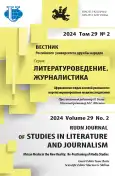Images on journalism and the power of media to turn the page in the history of crises: a Malian case
- Autores: Stoica D.S.1
-
Afiliações:
- West University of Timisoara
- Edição: Volume 29, Nº 2 (2024): African media in the new reality: re-positioning of media studies
- Páginas: 315-324
- Seção: JOURNALISM
- URL: https://journal-vniispk.ru/2312-9220/article/view/319210
- DOI: https://doi.org/10.22363/2312-9220-2024-29-2-315-324
- EDN: https://elibrary.ru/SIRKFQ
- ID: 319210
Citar
Texto integral
Resumo
A few images on journalism and its actors in the Sahel, and specifically Mali, that are shaped by the media itself, are presented. These images, identified in articles that capitalize on the challenges of political, social, and cultural crisis, as well as the risks that a journalist takes when reporting and writing on the realities and events he observes in Sahel, are supposed to shape the power of the media to bring change at an epistemological level in the society it unpacks and depicts. This epistemological metamorphosis is seen as a turning of a page in the history of crises and the proposal herein is to see what type of change this turning refers to, re-launching critical perspectives on the new powers or non-powers of journalists and journalism to inform, create and maintain a critical resistance meant to leave a relevant sign in the history, through deconstruction and management of crises communication, that would finally assure the durable control of crises, exercised by an informed and empowered society with the scope to overcome crises at a pragmatic and epistemic level. The analysis is qualitative and intends to invite the reader to more reflection on the interdependencies between the reality, the journalistic reality, and the journalist’s power or non-power to coin the two. Crises whose management from the point of view of public awareness and truth knowledge is compromised by a second-level crisis affecting the journalists, the leaders of the civil society, and broadly the media, who have concomitant powers and non-powers to change the perception of the public on the first level crises to such a point that, in the holistic interpretation of the term, this management of crisis through deflection should be considered a new page turned in the history of crises.
Palavras-chave
Sobre autores
Diana Stoica
West University of Timisoara
Autor responsável pela correspondência
Email: diana.stoica80@e-uvt.ro
ORCID ID: 0009-0008-5289-4508
Associate Fellow, Ubuntu Centre for African Studies
4 Vasile Parvan Blvd, Timisoara, 300223, RomaniaBibliografia
- Allan, S. (2013). Citizen witnessing: Revisioning journalism in times of crisis. John Wiley & Sons.
- Benyera, E. (2020). Reimagining justice, human rights and leadership in Africa. Springer. https://doi.org/10.1007/978-3-030-25143-7
- Fuller, J. (2010). What is happening to news: The information explosion and the crisis in journalism. University of Chicago Press.
- Hachten, W.A. (2005). The troubles of journalism: A critical look at what's right and wrong with the press. Routledge.
- Hamminga, B. (Ed.). (2016). Knowledge cultures: Comparative western and African epistemology. Poznan Studies in the Philosophy of Sciences and the Humanities (vol. 88). Amsterdam, NewYork: Editions Rodopi B.V.
- Hanusch, F. (2010). Representing death in the news: Journalism, media and mortality. Springer.
- Heath, R.L., & Palenchar, M.J. (2008). Strategic issues management: Organizations and public policy challenges. SAGE Publications.
- Kovach, B., & Rosenstiel, T. (2001). The elements of journalism: What newspeople should know and the public should expect. Crown.
- Mortensen, M. (2014). Journalism and eyewitness images: Digital media. Participation and conflict. New York: Routledge. http://doi.org/10.4324/9780203520680
- Pavlik, J.V. (2001). Journalism and new media. New York: Columbia University Press.
- Schulz, D.E. (2012). Culture and customs of Mali. Bloomsbury Academic Publishing.
- Vermeersch, E., Coleman, J., Demuynck, M., & Dal Santo, E. (2020). Social media in Mali and its relation to violent extremism: A youth perspective. International Counter-Terrorist Centre (ICCT). Retrieved December 19, 2023, from https://www.icct.nl/publication/social-media-mali-and-its-relation-violent-extremism-youth-perspective
Arquivos suplementares









